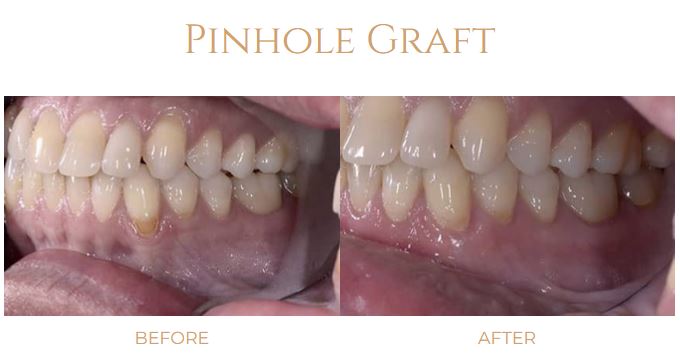Many people who have sensitive teeth are concerned about receiving cosmetic dentistry. They don’t want the treatment to affect their teeth in a way that increases sensitivity. If your teeth are sensitive, should you be concerned about whether or not cosmetic dentistry is for you?
Before you receive cosmetic dental treatment—including teeth whitening, dental crowns, or porcelain veneers—your dentist will examine your teeth and gums to ensure they are healthy. If you’re experiencing sensitivity in your teeth, the cause of it will be identified first.
What Causes Sensitivity?
Tooth sensitivity is common. There are several possible causes. The issues should be addressed before you receive cosmetic dentistry.
- Exposed dentin – Dentin is the tissue beneath the tooth enamel. If the enamel is worn or decayed, sensitivity and pain can occur. Cold food or drinks, even cold air, can increase sensitivity. Several factors can cause enamel to wear away. Acidic foods and drinks, brushing too vigorously, or grinding your teeth can wear down the enamel.
- Receding gums – Gum tissue protects tooth roots. When gums recede, the roots are exposed, which can cause tooth sensitivity. Gum disease, genetics, or hormonal changes can cause gums to recede. Aggressive teeth brushing can also cause gum recession.
- Trauma – An impact on your face and teeth can cause internal damage to your teeth. A tooth doesn’t have to break or crack for the pulp or living tissue inside the tooth to be disturbed. Irritation in a tooth can irritate the nerves and create sensitivity.
- Teeth clenching or grinding – These habits pressure your teeth and can cause sensitivity and pain.
What Is the Treatment for Sensitive Teeth?
Treatment for sensitive teeth depends on its cause. You may need treatment from a dentist or periodontist (gum specialist) to resolve your signs and symptoms.
- Exposed dentin – A skilled cosmetic can apply dental bonding to protect your tooth enamel or recommend other options for sensitive tooth enamel.
- Receding gums – Pinhole Gum Rejuvenation® or a gum graft from a periodontist can restore your gum tissue.
- Trauma – After an exam and X-ray, your dentist will determine whether a tooth needs root canal treatment to recover.
- Teeth clenching or grinding – A custom nightguard minimizes the impact of grinding your teeth while you sleep.
Can You Receive Cosmetic Dentistry?
After a dentist or periodontist has controlled your tooth sensitivity, you should be ready for cosmetic dentistry. Depending on what type of cosmetic treatment you receive, the sensitivity in your teeth could increase if left untreated. If genetics is a factor, your dentist will consider that and tailor your treatment accordingly.
How Can You Help?
You can take these precautions to minimize teeth sensitivity before your smile makeover:
- Replace abrasive toothpaste with toothpaste for sensitive teeth.
- Avoid aggressive brushing and use a soft-bristled toothbrush.
- Tell your dentist if you clench or grind your teeth. A custom nightguard can help your jaw relax and decrease the pressure on your teeth and jaws.
- Visit a periodontist if you have gum recession or gum disease signs or symptoms.
Cosmetic dentistry can still be an option for getting the smile you’ve always wanted, but take care of your oral health first.
Dr. David Pumphrey, an Atlanta periodontist, sponsors this post.

Gum graft – Pinhole Surgical Technique
Completed by Dr. David Pumphrey of Atlanta







